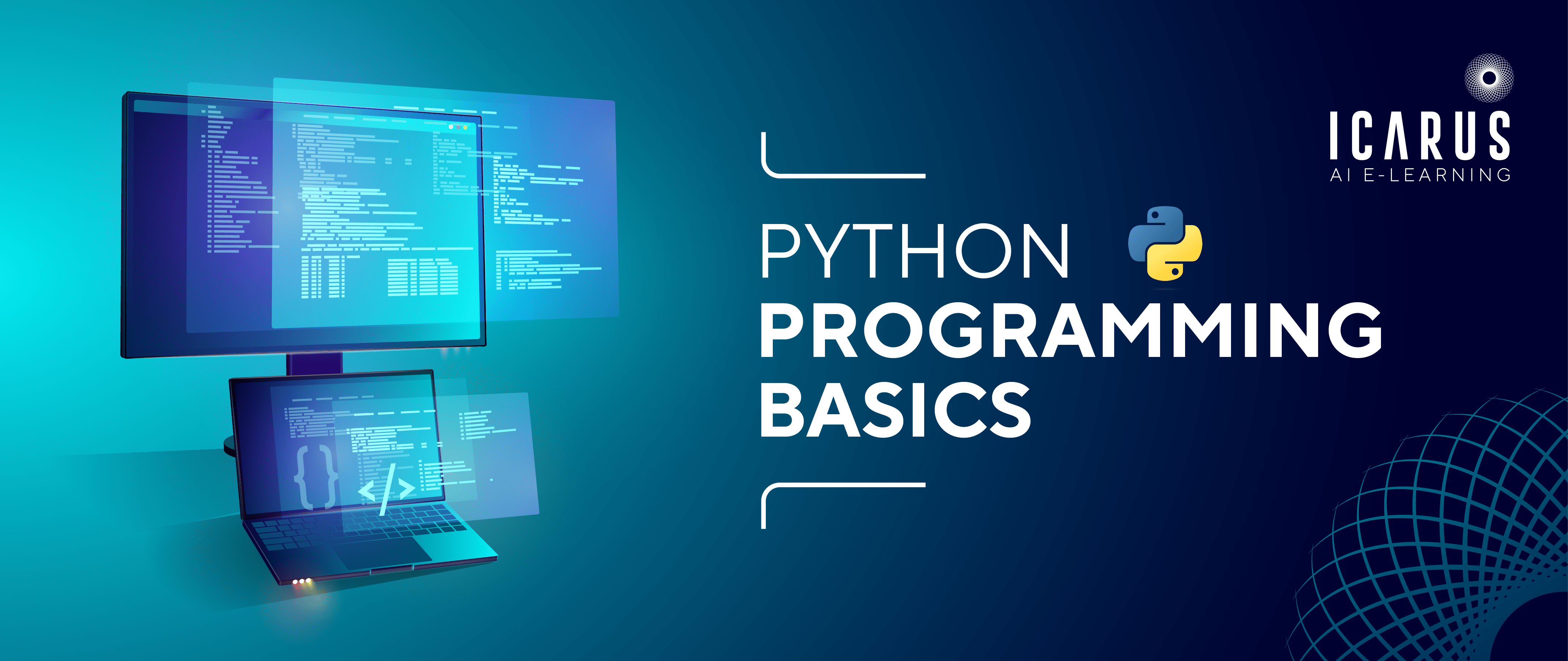
Course Details
Welcome to Python Programming Basics! This non-credit, self-paced training course will introduce you to Python and show you how to use it on both your home computer. No prior knowledge is required for this course.
- Use various single value datatypes (e.g., integers, floats, strings, and Boolean)
- Use multi-value collections in Python (e.g., lists, tuples, sets, and dictionaries)
- Demonstrate knowledge of loops in Python (while-else and for loops)
- Demonstrate ability to handle text files in Python
- Construct a Python program that includes the use of functions
Lessons
Welcome to Python Programming Basics! This non-credit, self-paced training course will introduce you to Python and show you how to use it on both your home computer.
This lesson will provide an overview of Python principles such as the definitions of key concepts and use cases for the python language as well as print statements and how they apply to core programming concepts we will use throughout the course
This lesson will introduce Spyder and go into detail on how to use the programming software in regards to Python including examples of using the print command reviewed in the previous lesson
Welcome to your first quiz, where you will review the introductory Python topics explored thus far through hands-on exercises in the offered programming box
This lesson will offer an overview of various values, variables, and statements with definitions and use cases as well as the data types that can be held within certain variables such as booleans, text, numeric values, and mapping
This lesson will provide an overview of keywords as fundamental building blocks on any python program as well as built-in functions and methods to identify these items within a program using Spyder
This lesson will provide an overview of the definition and use cases of comments within a program including the various ways comments can be implemented in the code in a way that is ignored by the program and when comments can be useful to add into a program
Welcome to your second quiz, where you will review the topics on terminology explored thus far through hands-on exercises in the offered programming box.
This lesson will provide an overview of numerical values in Python which include integers, floating values, complex numbers, as well as operators which can add, subtract, etc. as well as the way they operate within a program and their use cases
This lesson will provide an overview of strings in Python including methods of identifying strings, functions used to modify strings, User Input Statements, and escape characters with examples to help improve student understanding
This lesson will provide an overview of booleans in Python including a thorough description of true or false statements and their contingencies as well as how booleans apply to a program and its individual strings with various examples
This lesson will provide an overview of Conditions in Python including common methods for strategizing if...else statements, types of if...else statements, as well as a breakdown for how these statements function in a program with examples
This lesson will provide an overview of while-else loops in Python including common methods for strategizing while-else loops, requirements for while-else loops to work within a program, and how while-else loops relate to if...else conditional statements with examples
Module 3 Number Guessing Game • Modules in Python
In this demonstration, we put what we've learned in this module to the test in a Number-Guessing Game that utilizes numerical values, strings booleans, conditional statements, while-else loops and modules to create a cohesive, playable game.
Welcome to your third quiz, where you will be tasked with recreating the Number-Guessing Game within the programming box using the offered instructions
This lesson will provide an overview of Collections in Python including various types of data and how they relate to collections, how to recognize collections within strings, as well as various functions within Python that use collections and how they impact results
This lesson will provide an overview of Lists in Python including different components of lists and how lists are defined, how to update information within lists, as well as how to combine other components within Python with lists with examples
This lesson will provide an overview of Tuples in Python including details on how tuples and lists differ, how to identify tuples, and how to change various components of tuples with examples
This lesson will provide an overview of dictionaries in Python including the relationship between dictionaries and collections, key details that define dictionaries, details on keys, an overview on dictionary functions, and more
Module 4 RPSLS Game • Dictionaries in Python
This lesson will provide an overview of loops in Python, break statements and how they relate to loops, range functions, and details on nested loops with examples
In this demonstration, we put what we've learned in this module to the test in a Rock, Paper, Scissors, Lizard, Spock Game that utilizes collections, lists, loops, tuples, sets, and dictionaries to create a cohesive, playable game
Welcome to your fourth quiz, where you will be tasked with recreating the Rock, Paper, Scissors, Lizard, Spock Game within the programming box using the offered instructions.
This lesson will provide an overview of File Handling in Python, built-in file types, how to manage files in various locations, open them for reading, and further details on closing and adding to files with examples
In this demonstration, we put what we've learned in this module to the test in a Quiz Game that utilizes file-handling to create a cohesive, playable game
Welcome to your fifth quiz, where you will be tasked with recreating the Quiz Game within the programming box using the offered instructions
Module 6 Final Game • Global Variables in Python
Module 6 Final Game • Demo
Module 6 Final Game • Functions in Python
Welcome to your sixth and final quiz, where you will be tasked with recreating the Final Game within the programming box using the offered instructions


